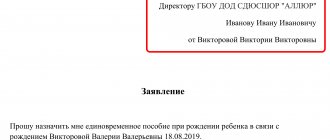Is it possible to resign at will while on sick leave?
Termination of the employment relationship between an employer and an employee while the employee is on sick leave is possible if:
- the employment relationship is terminated by agreement of the parties;
- the employment contract is terminated at the initiative of the employee.
Moreover, in the second case, the days the employee is on sick leave are included in the period of compulsory work between the dates of the application for dismissal and the actual dismissal. Unless otherwise specified in a separate agreement, the relevant period is 2 weeks. So if an employee has been undergoing treatment for more than 2 weeks since submitting the application, then after recovery he does not need to go to work.
An employee may withdraw his or her resignation letter on sick leave until the end of the working period or before the date specified in a separate agreement between him and the employer. In this case, he will be able to continue working after completion of treatment, if at the time of withdrawal of the application the company did not undertake to hire another employee (and did not formalize this obligation in writing).
How to write an application correctly?
As practice shows, dismissal and sick leave are a problem not only for employees, but also for employers themselves. There are often situations when an employee, while on leave due to temporary disability, expresses a desire to leave the enterprise. The question arises: is it possible to resign of your own free will while on sick leave or do you need to wait for recovery and only then apply?
According to the Labor Code, namely Article 80, an employee can submit a letter of resignation at any time convenient for him, the main thing is to notify the head of the organization in advance.
This period must be at least 14 days. Where the worker will be at this moment does not matter. This means that a worker during illness can submit a letter of resignation, and the employer, after waiting for a certain period, can issue an order to terminate the employment relationship with the employee.
An employee who is in the hospital may wonder whether it is possible to resign without appearing at work and what the procedure is. The law does not establish the exact form of notification of resignation; it is even possible to call the employer. However, a written form is needed so that in case of disagreement the employee has evidence of his intentions.
Therefore, if he cannot submit a letter of resignation on his own, you can send the document in a valuable letter.
In this case, the former employer will have to pay for sick leave in the amount that was established for the employee. Those who quit have the right to submit a certificate of incapacity for work for payment within six months.
Often, an employee who quits on his own initiative during illness is afraid that if he submits a letter of resignation, after recovery he will have to stay in the organization for another 2 weeks. This is wrong. The employee has the right, having already notified his superiors in writing, to either go on vacation or take a ballot.
In the era of coronavirus, everyone is looking for additional opportunities to earn money. It’s surprising that you can earn much more using alternative methods, up to millions of rubles a month. One of our best authors wrote an excellent article about how thousands of people make money in the gaming industry on the Internet. Read the article with reviews about making money on games in the best establishments.
How does an employer accept a resignation letter during sick leave?
An employee on sick leave can submit a letter of resignation to the employer in person or by sending the document to the company by mail. At the same time, the employee can inform the employer of his consent to accept the work book upon the fact that the employer issues an order to terminate the employment contract with the employee by mail.
At the same time, the dismissal order indicates that the employer does not have the opportunity to hand over this document to the employee personally.
If an employee on sick leave has not informed the employer of his consent to receive documents by mail, the employer must notify the employee himself:
- about the need to appear for a work book;
- if it is impossible to appear, inform the company of your consent to receive the work book (and dismissal order) by mail.
Reasons for termination of an employment contract
When applying for a job, a new employee enters into an agreement with the organization, which is regulated by the provisions of the Labor Code of the Russian Federation. Termination of this agreement may occur for various reasons:
- at the request of the employee;
- at the initiative of the employer;
- by agreement of both parties;
- due to circumstances beyond the control of both parties;
- when moving to a new position;
- in case of violation of the rules of the employment contract;
- upon expiration of the contract.
The most convenient option for both parties is mutual consent. In this case, the employee and manager can enter into an agreement that will be beneficial to both. Usually, in this case, the employee receives additional payments, and the employer guarantees that the agreement will not be canceled or challenged due to changed circumstances in the employee’s life.
Dismissal for inadequacy of the position is a rare option, as it is often difficult to prove.
An employee who does not show up for work may subsequently bring sick leave, in which case he will not be counted as absenteeism. Professional unsuitability can only be revealed in the event of a general certification that meets the requirements of the law.
The most common is leaving work of your own free will. Sometimes, even in the case of serious violations, the employer gives the person the opportunity to write a statement on his own so that dismissal under the article is not recorded in the work book.
But more often a person simply finds another, higher-paying, prestigious or convenient vacancy or moves.
Sometimes the reason for dismissal is reluctance to work under new management, unpreparedness for business trips, changes in working conditions, or deteriorating health.
After the written application, a two-week work period follows , but often people try to reduce it or avoid it altogether. Since sick leave is included in service upon dismissal, sometimes it is taken so as not to return to the place of duty. But before making hasty decisions, you need to know how many days you are supposed to work in different situations.
https://youtu.be/d9KY6ZSVXO0
Sick leave pay upon dismissal and after it
The fact that an employee submits a letter of resignation to the employer while on sick leave does not in any way affect the mechanism for providing the employee with compensation for a certificate of incapacity for work. Even if an employee is dismissed at his own request while on sick leave, the employer company is obliged to pay him full compensation, provided and calculated in accordance with the law, as if the person had not expressed a desire to resign during the period of incapacity.
You can learn how compensation for sick leave is calculated in the article “Accrual of sick leave - an example.”
The legislation of the Russian Federation also provides for a legal mechanism by which a person has the right to receive compensation for sick leave and after dismissal (no matter whether it is due to personal desire or other reasons). True, it is provided in many cases in a much smaller amount, and also subject to a number of conditions.
You can familiarize yourself with the features of this mechanism in the article “Payment of sick leave after dismissal in 2019.”
A common special case of labor relations is when a person goes on sick leave on the day of dismissal at his own request. Let's study what consequences may arise for the employer in this scenario.
Can an employee quit while on sick leave?
Labor relations between employee and employer are regulated by the Labor Code of the Russian Federation. It notes that if a citizen falls ill and has issued a certificate of incapacity for work, then the organization’s management does not have the right to dismiss him on its own initiative. This point is specified in Article 81 of the Labor Code of the Russian Federation.
Important! Termination of an employment contract at the initiative of the employer during the period of incapacity for work of a citizen is allowed only when the company is liquidated or the activities of an individual entrepreneur are terminated.
But, there are times when you yourself want to resign, despite being on sick leave, or a statement of your own free will has already been written, but a period of temporary incapacity has begun. Labor legislation provides for the occurrence of such situations, and the specialist has the right to terminate the employment relationship with the employer in any of the above cases on his own initiative.
When the dismissal is initiated by the worker himself by writing a letter of resignation, there is no reason for the employer not to release him from work on the specified day. It happens that after writing an application, an employee becomes ill, or decides to resign during illness. The combination of sick leave and dismissal must occur in accordance with the law.
- The employee wrote a statement and after some time fell ill. According to the law, he was supposed to work for another 2 weeks, but instead he went on sick leave. What to do with dismissal? The situation can develop in different ways.
- The employee will recover before the expiration of 2 weeks, return from sick leave and resign on the planned day.
- The employee continues to be ill longer than the time left before dismissal: the order will still be issued on the day specified in the application. The employee’s will is clearly expressed; the employer has no right to change it without written consent. So, the employee will be fired according to his application, and sick leave will be paid upon recovery after dismissal.
- The employee, while on sick leave, withdrew his resignation letter. In this case, the employer will wait for the termination of temporary disability and resolve issues of further cooperation after the closure of the sick leave.
- The employee decided to resign during illness. An application for dismissal can be submitted at any time, both during vacation and on sick leave, as explained in the letter of Rostrud No. 1551-6 dated 09/05/2006. Naturally, the desired date of dismissal should be on 14 days from the date of application.
It does not matter whether the employee has time to recover during this time - the law prescribes termination of the employment relationship on a specified date. If, on the day of dismissal, a sick employee was unable to come to receive his work and pay slip, he must be notified. The employer is obliged to do this so as not to be responsible for the delay in the work book. The work report, with the written permission of the employee, can be sent to him by mail, and the money can be credited to his bank card on time.
NOTE! In most controversial cases, the Labor Code of the Russian Federation protects the interests of employees, which is especially clear in the example of sick leave: the working time is running out, and the person is quietly recovering during this time. The employer does not have the right to extend the two-week work period after leaving sick leave.
An employee may fall ill during compulsory work. An employer does not have the right to force an employee to work, motivating his actions by the fact that the latter was on sick leave while working. Sick leave counts toward the mandatory two-week period of work, even if it is closed after the employee’s dismissal.
In addition, sick leave will be fully paid.
Is it possible to fire a person who is on sick leave? If an employer wishes to dismiss his employee, he can only be guided by the grounds listed in Art.
Often people come to get the book after dismissal themselves, and then the HR department inspector fills out his application and carries out the calculation. According to Art. 5 of Federal Law No. 255, the entire period of incapacity must be paid. Payment of money is carried out in two cases: sick leave was opened for a working person; the illness occurred within 30 days after the termination of the employment relationship.
Payment upon voluntary dismissal occurs in the same way as in the case of compensation for an employee undergoing treatment who has not declared a desire to resign.
But the trouble is, a week passed and he got sick.
What possible options for the development of the situation? Option one, the simplest: the employee has time to recover before the date of dismissal. Everything is simple here: the person is fired according to his application.
How sick leave is paid In other words, if an employee quits and after some time brings sick leave, the start date of which does not exceed 30 calendar days after the date of dismissal, the employer is obliged to pay for it. 1 letter of Rostrud dated 09/05/2006 No. 1551-6
The employer does not have the right to fire an employee with whom an open-ended employment contract is concluded during a period of temporary incapacity. The exception is the case when the organization is liquidated or the entrepreneur-employer ceases its activities (Art.
Many people are interested in the question of the possibility of voluntarily dismissal during sick leave. Let's talk about this in more detail.
- a dismissal order is written;
- a note is made in the work book and personal card;
- sick leave and other debts to the employee are paid.
There are situations when an employer forces an employee to work off the time missed during illness (14 days). He has no right to do this (letter of Rostrud dated 09/05/2006 No. 1551-6).
Is it possible to fire an employee during sick leave at the request of an employee? Yes it is possible. After informing the employer of the desire to terminate the employment contract, the employee can be either on vacation or on sick leave.
If for any reason during illness an employee changes his mind about resigning, he has the right to withdraw his application (it is advisable to do this in writing).
There are often situations when an employee is about to quit and suddenly gets sick unexpectedly. Or, after the dismissal of his own free will occurred, he came and provided a sick leave certificate, which indicates that he was ill at the time of dismissal. Let's consider what to do in each situation so as not to violate the law and the rights of the employee upon dismissal.
Such cases occur frequently. This may be due to the fact that the employee’s illness has been prolonged, and he clearly understands that he cannot continue to work like this. But there are also coincidences between an employee’s desire to quit and the sudden onset of illness. Unfortunately, no one can predict the onset of the disease, just as no one can insure themselves against being on sick leave.
Article 80 of the Labor Code gives an employee the right to resign at his own request. But you need to notify the employer of your decision in advance - two weeks. But an employee is not deprived of the right to resign while on sick leave. He can send a valuable letter with his resignation letter to the employer via postal service.
For example, an employee wrote a letter of resignation addressed to the manager of his own free will. The employee is required by law to work for two weeks. But, the employee fell ill a week before the dismissal date. Does the employer need to wait until the employee returns from sick leave to issue a dismissal order? Or dismiss the employee on the date indicated in the application? The legislator explains that the dismissal of an employee occurs at his request, regardless of his being on sick leave.
But if it happened that before the sick leave, the employee submitted a letter of resignation, and together with the sick leave, came to work himself. And he began to fulfill his work duties. In this case, if another employee has not been hired in his place, the company cannot fire him.
If, on the day of dismissal, a sick employee was unable to come to receive his work and pay slip, he must be notified. The employer is obliged to do this so as not to be responsible for the delay in the work book. The work report, with the written permission of the employee, can be sent to him by mail, and the money can be credited to his bank card on time.
The employer does not have the right to extend the two-week work period after leaving sick leave. Got sick while looking for a new job It would seem that after the termination of the employment relationship with the employer, the health of the former employee is already his own problem.
Taking sick leave on the day of dismissal at the initiative of the employee: legal consequences for the employer
In general, the fact that an employee goes on sick leave on the day of dismissal (or any other day while he is officially registered with the company) at his own request does not prevent the further implementation of the dismissal mechanism. That is, in this case, having gone on sick leave, the very next day the person ceases to be an employee of the company.
Having been cured and received compensation for a certificate of incapacity for work (provided within the framework of the mechanisms we discussed above), the citizen ceases to be an authorized or obligated party in legal relations with the company in which he worked at the time of going on sick leave.
It is worth noting that an employee on sick leave can withdraw his resignation letter even on the last day of the employment contract with the company. If the employer has not committed to hiring another person by that time, then after the recovered employee returns to work, he will have to continue the employment relationship with him.
In what cases can an employee not be fired on sick leave?
Article 81 of the Labor Code guarantees protection from tyranny of superiors when dismissing persons on sick leave or on vacation. The employer's initiative is allowed only in cases of liquidation of the enterprise. But here, too, termination of work duties is recorded after the end of outpatient or inpatient treatment.
Resigning from sick leave at your own request is a painless process for a full-time employee. During this period, the personnel and accounting services of the enterprise must clearly fulfill their duties so as not to violate the constitutional rights of the employee. Otherwise, the organization pays penalties for late payment of estimated amounts, and the employer risks receiving an administrative fine. A secondary violation entails disqualification of the manager.
Results
One of the few legal ways to terminate an employment contract while an employee is on sick leave is to submit a statement of intent to terminate the employment relationship with the company at his own request. In addition, when an employee submits this application and subsequently goes on sick leave, his employment contract is nevertheless terminated upon the expiration of the work period or the arrival of the date specified in the agreement between the employee and the employer.
Payment of sick leave upon voluntary dismissal occurs in the same way as in the case of compensation for an employee being treated who has not declared a desire to resign.
You can find more complete information on the topic in ConsultantPlus. Full and free access to the system for 2 days.
In advance
Both employees and employers will have to remember some rules. The thing is that dismissal on personal initiative requires a certain time investment. By law, every person who wants to stop collaborating with a particular boss must give advance notice of his intentions. We are talking about writing a statement in the established form.
In advance - this is at least 14 days before the expected day of termination of the employment relationship. Accordingly, citizens cannot simply leave work and in the shortest possible time. Dismissal on sick leave at your own request is common in Russia. But why?











